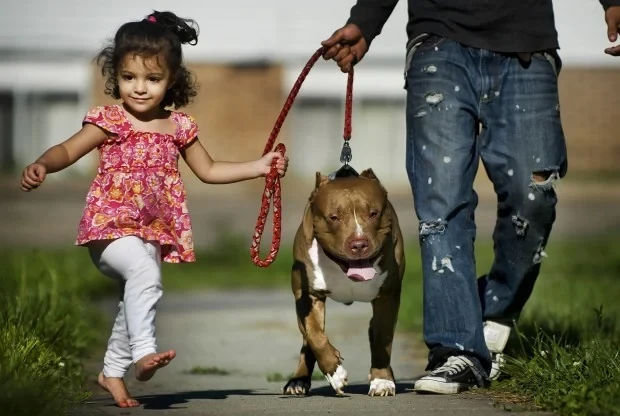American Pit Bull Terrier: The Reality vs. The Stereotype

Pit bull-type dogs are often subjected to a myriad of misconceptions, leading to widespread fear, bias, and even breed-specific legislation (BSL). This comprehensive guide aims to dismantle these ingrained prejudices by replacing fallacies with factual information based on scientific studies, expert opinions, and real-world evidence.
What Constitutes a 'Pit Bull'?
The term 'pit bull' is commonly believed to represent a specific breed. However, 'pit bull' is more accurately an umbrella term encompassing several breeds. Dogs that fall under this category include the American Pit Bull Terrier, American Staffordshire Terrier, Staffordshire Bull Terrier, and the American Bully. They share similar physical characteristics and heritage, hence their grouping under the 'pit bull' classification.
There are several breeds frequently mistaken for pit bulls due to physical resemblances. These breeds, which include the Bullmastiff, Boxer, Alpha Blue Blood Bulldog, Cane Corso, Perro de Presa Canario, and Dogo Argentino, are not considered 'pit bulls' despite any surface similarities. These breeds have different genetic makeup and distinct breed histories, setting them apart from pit bull-type dogs.
Are Pit Bulls More Dangerous?
Contrary to the common perception, pit bulls are not inherently more dangerous than other breeds. The American Veterinary Medical Association (AVMA) states that controlled studies haven't identified pit bulls as disproportionately dangerous. While any dog can cause harm given the right circumstances, serious dog bite-related incidents are not a breed-specific issue. Over 50 different breeds have been implicated in fatal dog attacks in the United States since 2016, indicating that serious aggression is a trait that isn't limited to pit bulls.
Public perception of pit bulls' aggression is significantly influenced by media bias, leading to disproportionate reporting of incidents involving pit bulls. Such selective reporting further fuels the stereotypes, overshadowing the fact that pit bulls, like any other breed, have the potential to be loving, gentle pets when raised in a supportive environment.
The Myth of the "Locking Jaw" and Bite Force
There's a long-standing myth surrounding the pit bull's jaw — the concept of the "locking jaw." This myth purports that pit bulls have a unique mechanism that enables their jaws to lock, making their bite more dangerous. However, this is simply not true. No breed of dog, including pit bulls, has a physical characteristic that would enable their jaws to lock.
Another common myth is the supposed superior bite force of pit bulls. Although often claimed that pit bulls have the highest bite force among all dog breeds, dogs like the Kangal and Mastiff possess a significantly stronger bite force. It's important to remember that a dog's bite force is dependent not only on its physical characteristics but also on its intention, size, and overall strength. A dog, irrespective of breed, defending itself or its territory might bite with full force, while the same dog might apply a gentler bite when playing.
Pit Bulls and Temperament
There's a general perception that pit bulls have a worse temperament compared to other breeds. However, when put to the test, this notion doesn't hold up. The American Temperament Test Society consistently records pit bull-type dogs achieving excellent temperament scores, often surpassing many breeds considered family-friendly. These results reinforce the idea that aggression isn't an inherent trait for pit bulls.
Moreover, due to their high intelligence, determination, and strength, pit bulls can perform admirably as service dogs, therapy dogs, K9 police dogs, and, of course, they can make affectionate family pets.
The Role of Genetics and Environment
Genetics do play a role in influencing a dog's physical traits and certain behaviors. However, the environment and upbringing of the dog play equally, if not more, significant roles. A dog that has a genetic predisposition towards aggression can still develop into a gentle, non-aggressive pet when raised in a nurturing, caring environment.
This understanding of the dog's triggers and managing these triggers can drastically reduce the risk of aggression. This does not only apply to pit bulls but is a general rule of thumb to ensure a safe environment for both the dog and its human companions.
The Issue of Banning Pit Bulls
Breed-specific legislation, such as banning pit bulls, is a contentious issue. While proponents of the ban argue it as a matter of public safety, opponents view it as a form of canine discrimination that unjustly penalizes responsible dog owners and their innocent pets.
A potentially more balanced approach to the issue could involve implementing stricter regulations on breeding practices. These regulations could ensure that breeders prioritize health, temperament, and overall animal welfare over aesthetics or certain physical traits.
Media Misrepresentation of Pitbulls
Media portrayal significantly contributes to the pit bull's negative reputation. In fact, studies indicate media outlets' breed misidentification error rates are as high as 40%, contributing to pit bull-type dogs' wrongful reputation. More often than not, irresponsible dog ownership, not breed, is the primary cause of dog bite-related incidents. Proper training, early socialization, and responsible pet care can drastically reduce the likelihood of aggressive incidents in dogs of any breed.
Dismantling the myths surrounding pit bull-type dogs and replacing them with the facts is vital to promoting a healthier understanding of these often misunderstood canines. When provided with the right opportunities, guidance, and a nurturing environment, pit bulls can indeed be the loyal, loving, and capable pets they have the potential to be.
Responsible pet ownership is key. It is crucial to remember that while pit bull-type dogs may have certain breed characteristics, each dog is an individual and should be treated as such. By providing appropriate training, adequate socialization, and abundant love, pit bulls can not only thrive but also change the prevailing negative perceptions.